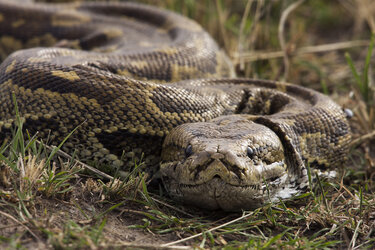Pythons eat less, require very little water and grow faster than beef cattle and chicken. Are they a better food for the planet? These scientists say yes.
The Washington PostRachel Pannett

Anup Shah/Getty Images
They’re scaly, fork-tongued and can measure upward of 20 feet long. Pythons may also be one of the most Earth-friendly meats to farm on the planet.
A group of researchers studied two large python species over 12 months on farms in Thailand and Vietnam — where snake meat is considered a delicacy — and found that they were more efficient to raise than other livestock.
Their research, published Thursday in the journal Scientific Reports, suggests that python farming could offer a solution to rising food insecurity around the globe, exacerbated by climate change.
The researchers, who studied more than 4,600 pythons, found that both Burmese and reticulated pythons grew rapidly in their first year of life, and they required less food (in terms of what’s known as feed conversion: the amount of feed to produce a pound of meat) than other farmed products, including chicken, beef, pork, salmon — and even crickets.
The snakes were fed a mix of locally sourced food, including wild-caught rodents, pork byproducts and fish pellets. They gained up to 1.6 ounces a day, with the females growing faster than their male counterparts.
The snakes were never force-fed, and the researchers found that the reptiles could fast for long periods without losing much body mass, which meant they required less labor for feeding than traditional farmed animals.
“They need very little water. A python can live off the dew that forms on its scales. In the morning, it just drinks off its scales and that’s enough,” said Daniel Natusch, a herpetologist and biodiversity expert who was involved in the research. “Theoretically you could just stop feeding it for a year.”
In a world where scientists predict climate change will lead to more extreme weatherand environmental shocks, a species that is heat-tolerant, resilient to food shortages and able to produce protein “far more efficiently than anything else studied to date” is “almost a dream come true,” Natusch said.
Tastes like chicken
Snakes have long been prized in Asia, where they are used in traditional medicines, as well as in dishes such as Hong Kong’s famed snake soup. In recent years, snake farms have sprung up across Southeast Asia and China, catering to growing demand for snake meat and skins, used in luxury leather goods.During his research, Natusch ate snake barbecued, sauteed on skewers, in curries and as jerky. He described the taste as similar to chicken, but a little more gamy. Because snakes don’t have limbs, very little is wasted in butchering, he said. And it is remarkably easy to fillet: “You just bring your knife along that backstrap and you get a four-meter-long piece of meat.”
Even so, Natusch acknowledges that snakes are unlikely to form a big part of Western diets any time soon. In his native Australia, he said, “the only good snake is a dead snake. People are pretty afraid of them.” (Pythons are nonvenomous and generally slow-moving, but they do have large teeth and may bite if provoked. They have been known to eat small pets including cats and dogs.)
In the United States, Burmese pythons are considered an invasive species, having proliferated in Florida’s Everglades, where they are hunted to cull the population. In a study last year, the U.S. Geological Survey described Florida’s python problem as “one of the most challenging invasive species management issues worldwide.”
Because store-bought meat is relatively inexpensive and easier to come by than catching these slippery creatures, Natusch doesn’t envision a future in which snake farming becomes a fix to America’s python woes. But he does see the snakes as a potential climate solution for farmers in places like Africa, where food insecurity is a growing problem as climate disasters outpace any innovation in farming techniques.
“As long as [farmers are] happy to catch a few pest rodents in their corn or their maize, and feed them to a python every now and again, you’ve got some high-quality, resilient protein right there,” he said.
Simple needs
A python’s needs are fairly basic. They’re sedentary by nature and coexist happily with other snakes, displaying “few of the complex animal welfare issues commonly seen in caged birds and mammals,” the researchers said.Although some conservationists have expressed concerns that commercial snake farming could lead to the illegal harvesting of wild populations, Natusch — who chairs a group of snake specialists for the International Union for Conservation of Nature — argues that the opposite is true: It gives local communities a financial incentiveto conserve wild populations and the habitats on which they depend.
The barriers to entry for snake farming are low in comparison with lab-grown meat, which carries significant costs and requires technical expertise. In Asia, snakes are housed in simple enclosures in warehouses. And even without the kind of genetic engineering applied over the years to domesticated animals like cows and chickens, snakes stand out, he said.
“We’re just scratching the surface here, basically the baseline product: The animal in its natural form without any domestication or anything, still outperforms all those other taxa.”
Article
